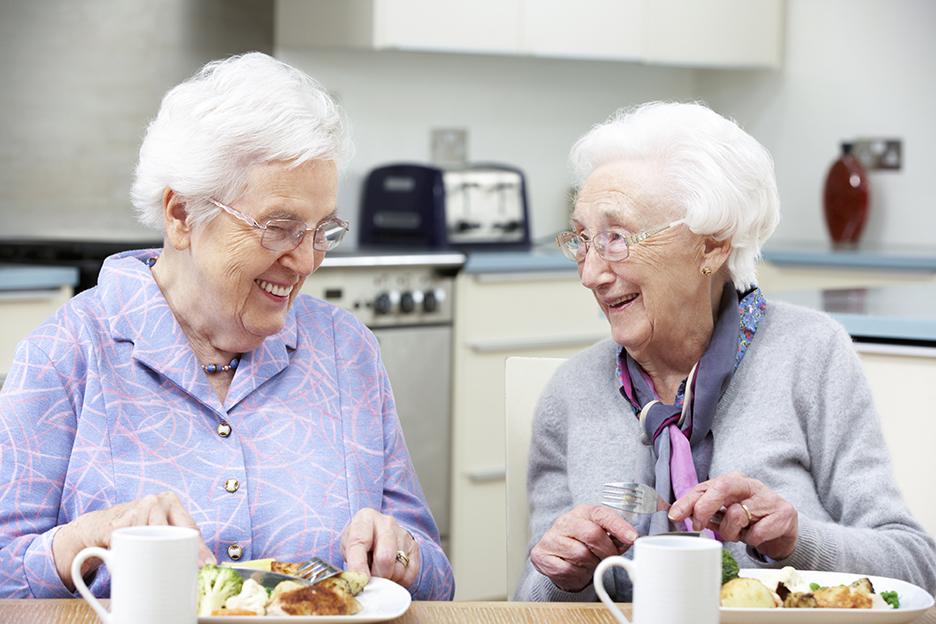For many of our previous generations, eating a lot was a sign of health. So what should you do when an elderly member of your family, such as a grandparent, starts losing weight or refuses to eat? You must follow certain measures to avoid undernutrition and its consequences.

A healthy appetite goes a long way
When you were a child, visiting Grandma was probably a thrill if she was known for sharing her many legendary recipes with guests. Thanks to her famous kitchen skills, you were treated to succulent stew, homemade fudge, delicious apple pie or divine chocolate cake. But now that she’s reached a certain age, Grandma’s views on food seem to have changed: the person who once had second helpings of everything now eats like a bird. What happened?
Unfortunately, it is not uncommon for people aged over 70 to not eat enough to meet their nutritional needs. Indeed, our metabolism slows down as we age, which means that the body spends less energy doing various activities. It is therefore normal for one’s appetite to diminish as well. Elderly people, even those who are in good health and whose weight is stable, feel less hungry than those who are younger. Also, after having a regular meal, they feel full sooner. In many cases, there is no need to worry, except when a seemingly normal loss of appetite leads to undernutrition.
Undernutrition: causes and risks
Undernutrition in the elderly is often due to many factors. They include, among others:
- physical illness or disease (ex: cancer, infection, digestive issues);
- mental illness (ex: depression or anxiety);
- neurological disease (ex: Alzheimer’s, Parkinson’s, dementia);
- isolation;
- dependence;
- family or interpersonal problems;
- oral or dental issues (ex: ill-fitting dentures, tooth or gum disease);
- certain treatments or medications;
- surgery.
Undernutrition can lead to serious consequences on a person’s health and well-being: loss of muscle, exhaustion, increased risk of falling, susceptibility to infections, aggravation of chronic illnesses, etc. It also contributes to reducing quality of life and, even worse, life expectancy. Therefore, it is imperative to understand its causes and find ways to remedy the situation.
Essential nutrients for the elderly
At all ages, we must consume a variety of foods, in sufficient quantities, to meet our nutritional needs. Vitamins, minerals, protein and carbohydrates all have their own role to play, for they are all essential to the human body’s proper functioning.
However, some nutrients need to be especially monitored since elderly people often don’t get enough of them. They are indispensable to maintaining their health. Here is some information about some of the most important nutrients.
Protein
Protein is one of the human body’s basic components. It plays several essential roles in our health, notably by contributing to preserving muscle mass. It is said that 30 to 50% of elderly people who live in a senior citizens’ home or similar establishment suffer from protein deficiency. Here are some examples of protein-rich foods:
- meat and fish;
- eggs;
- dairy;
- legumes;
- nuts and seeds.
People who are over the age of 70 should consume at least 0.8 g of protein per kilogram of body weight per day (0.8 g/kg/d).
Calcium and vitamin D
Calcium and vitamin D are essential nutrients for bones. They prevent a disease called osteoporosis, which makes bones fragile and increases the risk of accidental falls. Calcium and vitamin D are found in several foods, such as dairy products. Many people don’t consume enough calcium and vitamin D in their day; public-health authorities recommend a daily intake of 1,200 mg of calcium and 800 to 2,000 IU of vitamin D for all Canadians aged 50 and over. Ask your pharmacist to help you reach these goals; it is likely that he or she will recommend supplements.
Fibre
Most North Americans, including the elderly, do not eat enough fibre each day. However, fibre is full of health benefits: it prevents constipation, maintains bowel health, reduces cholesterol levels, etc. Several foods contain fibre, such as whole-grain bread and cereal, vegetables, fruits and legumes. Men over 70 should consume 30 g a day, while women should take 21 g. If needed, your pharmacist can suggest a fibre supplement to take on a daily basis.
Canada’s Food Guide: the best reference
To ensure a healthy, balanced diet, all Canadians should consult Canada’s Food Guide. It has been the top reference in healthy eating habits for many years, describing the quantities and types of foods that are recommended for Canadians over the age of two. Following the Guide’s recommendations will help you meet your needs in vitamins, minerals and other nutritional elements, as well as reduce the risks of certain health problems.
Appetizing advice
Here are a few additional tips that elderly people can benefit from to meet their nutritional needs on a daily basis:
- Make sure you get a sufficient daily energy intake. An elderly person’s diet should provide at least 1,500 calories for women and 2,000 for men.
- Consider taking vitamin and mineral supplements, especially if you are not eating enough fruits and vegetables.
- If you are not hungry, you can complete your diet by adding meal-replacement products. There are many to choose from: bars, “pudding,” nutritional beverages. To select the right ones, ask your pharmacist’s advice.
- Consult a nutritionist for personalized recommendations.
Because proper nutrition is the foundation of health, it is important to maintain it at all stages of life. And for the elderly, a poor diet can be rife with consequences. Accompany your elderly loved one on the path to a healthy, balanced diet, just like she or he may have done for you when you were young!
